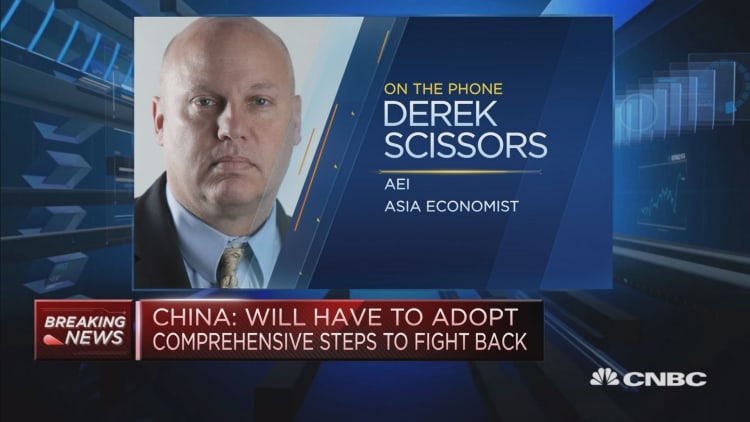As the world's two largest economies exchange threats of retaliatory tariffs, the rest of the world is watching closely for any knock-on repercussions.
Late on Monday, President Donald Trump threatened additional tariffs at a rate of 10 percent on $200 billion worth of Chinese goods. In response, China's Commerce Ministry has promised counter measures if Washington goes ahead.
It's the latest development in escalating trade tensions between the world's two largest economies. On Friday, the U.S. announced a 25 percent tariff on up to $50 billion of Chinese products, prompting Chinese President Xi Jinping's administration to respond with a 25 percent tariff on $34 billion of U.S. goods.
Such back-and-forth measures have sparked concerns that Washington and Beijing have entered into a full-on trade war. But it remains up for debate what exactly defines a trade war.
According to Derek Scissors, a resident scholar at the American Enterprise Institute,a trade war consists of actions that affect the full economies, not just a few sectors, of the countries involved.

If the proposed tariffs on both sides are enacted, then it's a trade war, said Max Baucus, former U.S. ambassador to China under President Barack Obama.
Trump's newest announcement of potential tariffs on an additional $200 billion worth of Chinese goods "does make a difference," but "we aren't there yet" for a trade war, said Richard McGregor, a senior fellow at Australia-based think tank the Lowy Institute. He explained that the initial list of U.S. tariffs on Chinese goods was "reasonably well chosen" so as to not hurt American consumers, but the additional levies would likely be felt by the U.S. population.
Others, however, said the current situation already amounts to a trade war.
"This is one," warned Deborah Elms, founder and executive director of the Asian Trade Centre: "$50 billion one way, $50 billion back, escalation to an additional $200 billion. Plus investment restrictions. We've never seen anything like this."
Meanwhile, U.S.-based industry group the National Retail Federation did not shy away from using the term for the current U.S.-China tensions: "This is just what we predicted — a tit-for-tat trade war has erupted and American families are caught in the middle," the group said in a statement.

